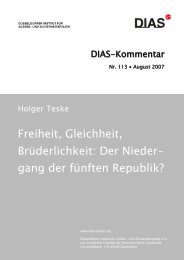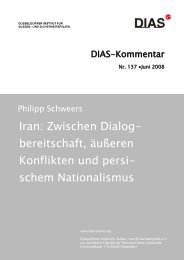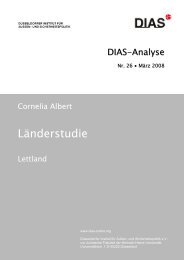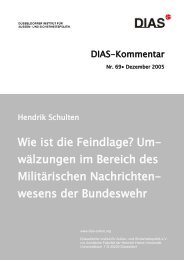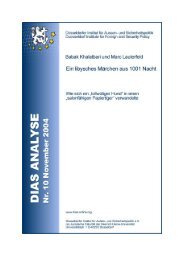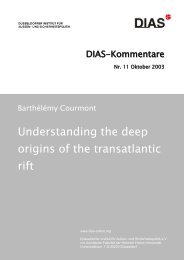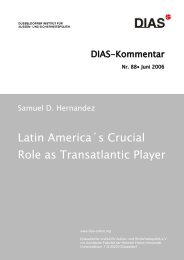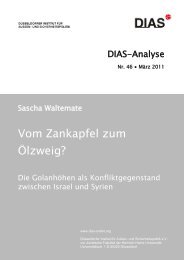NATO Collective Security or Defense - DIAS - Düsseldorfer Institut ...
NATO Collective Security or Defense - DIAS - Düsseldorfer Institut ...
NATO Collective Security or Defense - DIAS - Düsseldorfer Institut ...
You also want an ePaper? Increase the reach of your titles
YUMPU automatically turns print PDFs into web optimized ePapers that Google loves.
Joshua Stern: <strong>NATO</strong> <strong>Collective</strong> <strong>Security</strong> <strong>or</strong> <strong>Defense</strong>: The Future of <strong>NATO</strong> in Light of Expansion and 9/11<br />
tension manifested itself in other areas of the alliance, and reared it head in deliberations over<br />
providing defensive weapons to Turkey if it were attacked during the recent Iraq war. France<br />
held up the request and <strong>NATO</strong> was powerless to act f<strong>or</strong> a day. While this event was solved<br />
the next day, it raises some serious doubts about the cohesiveness of the alliance if it is divided<br />
over the US pol-icy on fighting terr<strong>or</strong>.<br />
Not only can coalitions of the willing <strong>or</strong> the use of <strong>NATO</strong> as a „toolbox‟ lead to division inside<br />
the alliance, but it can also lead to its demise. If members feel left out of the alliance <strong>or</strong><br />
feel they are being rendered powerless by US unilateral action they might look f<strong>or</strong> new ways<br />
<strong>or</strong> <strong>or</strong>-ganizations to deal with international security and project power. In the news recently,<br />
there have been many st<strong>or</strong>ies about the division between the US and European countries over<br />
EU f<strong>or</strong>ces and their separation from <strong>NATO</strong>. Even though the controversy has died down, the<br />
threat of a separate EU f<strong>or</strong>ce was a popular idea in light of US unilateral action. This hurts<br />
<strong>NATO</strong> because Europe can only aff<strong>or</strong>d one military capability, and if <strong>NATO</strong> members were<br />
to supp<strong>or</strong>t a sepa-rate EU f<strong>or</strong>ce this could be a deadly blow to <strong>NATO</strong> and its ability to act.<br />
All these problems relate back to the diversity in the alliance and the different interests of its<br />
members. The US, West Europe, and East Europe all have different security interests and see<br />
<strong>NATO</strong> as a means to fulfill these interests. In the case of Eastern Europe <strong>NATO</strong> is the collective<br />
defense <strong>or</strong>ganization that will protect their independence achieved after the fall of the<br />
Berlin Wall. Western Europe wants an alliance to deal with security issues and peacekeeping<br />
operations as a kind of UN with teeth, but wants it done with other members having a say.<br />
The US wants the alliance to fight terr<strong>or</strong>ism, but wants to use it to fit its unilateral tendency;<br />
basically to get the benefits of <strong>NATO</strong>, with none of the multilateral drawbacks. Can <strong>NATO</strong><br />
then, continue to be an effective and feasible alliance with these different interests?<br />
The answer is no. If it maintains its collective security nature the alliance is headed f<strong>or</strong> danger.<br />
Not a kind of danger where the alliance might disappear <strong>or</strong> the w<strong>or</strong>ld will split, but a<br />
danger the alliance will not be the c<strong>or</strong>nerstone of security in the 21st century. The reason is<br />
<strong>NATO</strong> is not fit to fight a war on terr<strong>or</strong>ism the way the US wants to fight it. During the Cold<br />
War, <strong>NATO</strong> held together because its focus was on stopping an invasion. The alliance had its<br />
problems, but their shared danger was strong enough to keep the alliance together. In fact, it<br />
did such a good job countries still want to join it based on this past perf<strong>or</strong>mance. It succeeded<br />
in the 1990‟s because the threats that existed were not immanent. It was easier to face nonimmanent<br />
threats through <strong>NATO</strong> because it provided an already used and successful framew<strong>or</strong>k<br />
f<strong>or</strong> collective action. M<strong>or</strong>eover, against lesser threats multilateral drawbacks are acceptable<br />
because they allow coun-tries to act in conflicts they usually would not if they were alone<br />
because the cost of action may outweigh their interest in the conflict.<br />
On the other hand, 9/11 changed every thing. Suddenly when security threats became real<br />
<strong>NATO</strong> was no longer desired in the same way, unless it submitted to US‟ interests. Since the<br />
danger of terr<strong>or</strong>ism and what it means differs among parties, the likelihood <strong>NATO</strong> as a whole<br />
would submit to fight terr<strong>or</strong>ism the way the US wants was unlikely. What if during the Cold<br />
War, the US decided to launch a preemptive strike against the USSR. It is very likely Western<br />
Europe‟s reaction would be comparable to the reaction about the war in Iraq. As hist<strong>or</strong>y has<br />
shown when members in a collective security alliance have different threats and interests it is<br />
harder f<strong>or</strong> them to w<strong>or</strong>k together. In the case of <strong>NATO</strong>, this fits because expansion and 9/11<br />
add a variety of new members who have different views on security issues.<br />
These differences cannot w<strong>or</strong>k in an <strong>or</strong>ganization that acts with all its members, loses legitimacy<br />
when members break off and act without other members, <strong>or</strong> f<strong>or</strong>m other <strong>or</strong>ganizations<br />
to deal with these problems. Even though <strong>NATO</strong> is not the UN (in matter of size and<br />
scope of w<strong>or</strong>ld issues), a division in the alliance makes it much harder f<strong>or</strong> it to act <strong>or</strong> be effec-



